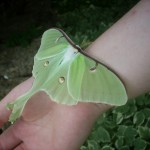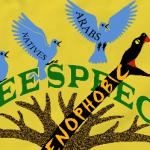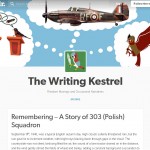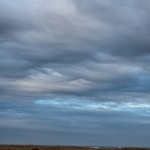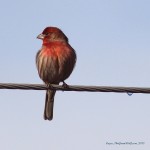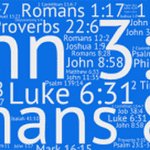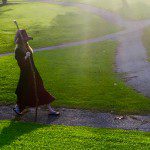From reading the word ‘animals’ what is the first thing that comes to mind? Think on that a bit before reading on….

In Anishinabek (Ojibwe) tradition individuals are part of a clan. These clans determine your role in the community and often your character. Your clan is usually inherited, if not it can be found through a ‘medicine’ person. There are common clan groups such as Bear, Fish, Eagle, and Wolf. And there are some individuals that fall into uncommon territory where not much is known about their role and meaning. As an example, I met someone who was Duck clan (anyone who happens to know anything about what it means to be Duck Clan, shoot me an e-mail as this individual would love to know too).
Being Metis, I did not learn what my inherited clan was, so I had to rediscover it. This is where I, and others, were surprised. I was not to be told my clan, even though I had previously received my name but a year before from the same medicine person. I was instructed that I had to discover it myself. How would I know what my clan was? I was told that when I found it I would have no doubt.
I had scrambled to know where I belonged. What clan was I? Its been over 6 months since that time and I’ve finally come to know…
Before revealing my discovery I’ll go into my internal debates that conflicted me from the beginning of this journey.
The first thing that I had to know was what the clans were? The clans were usually animals. What made these animals clans? There is much to be learned from them, to be certain. Each animal has something that we could benefit from knowing them better. Each established clan already has associated meanings, roles and symbolism. I had studied this before, and come to know more through my interactions with others who knew their clan and informed me on it. But hit a bit of a roadblock.
Through my formal studies and workshops, I personally instructed people on relating with other species, to learn about their true nature. A big problem I encounter is symbolic associations, stereotypes, and myths.
A popular view is bats getting tangled in your hair – myth. With their echo location they are excellent night time fliers and want nothing to do with your hair, being more interested in their night time bug feast, making them superb for bug control. Don’t want mosquitoes? Put up a bat-house. In Anishinabek and many other indigenous teachings, the Owl is a creature of bad omen and often considered evil. Such a view was also mentioned in Shakespeare’s works. Why is this so? Well, because we’re diurnal (creatures of the day) creatures of the night tend to be considered “other” and because of not understanding who they are, are feared. I and others teach about what owls are and their life. A wonderful example of this is the introduction of barn owls in Alexandra as ecological control for rats in the city, and the public education to remove the stigmas against owls for this to work. Predators in general get a bad reputation, a very common one being wolves. Which can be a whole other article onto itself, but won’t get into that now. Strangely, positive associations do just as much damage. One example being humming birds, being associated with good fortune. Not to mention being pretty cool in general. Positive symbolization of this creature and others usually creates a mental box for them, where people forget that they are more than just their symbolism. Leading to people feeding the humming birds splenda – because if it is good for us it should be good for them right? Dead Wrong. And what I mean by dead wrong is that many humming birds died. A result of not getting the nutrition they needed even though they thought they were getting it because “it tastes like sugar”. Another example is people feeding deer corn, which changes their gut biota and causes them to become dependent on the corn because they are now unable to properly digest their wild foods. On top of that, the corn is simply bad for the gut in general, causing bloat which is fatal. (I personally don’t recommend feeding wildlife either way, habituation through direct feeding is bad for them and you because you become responsible and they become dependent – limiting their freedom. A better way to bring in desired wildlife is to plant perennials that these creatures consume, or use for shelter. Since it is spring it is an excellent time to consider this.) In summary, any symbolism, myth, or stereotype can be very bad for wildlife. I learned that clans perpetuate stereotypes, i.e. Goose Clan is like this, Frog clan is like that etc. and therefore are problematic.
Even with all this in mind, I still was determined to discover my clan, as it resolves my role in the community, and I want to learn the ways of my ancestors as there may yet be valuable lessons and truths to be found. This lead to going back to one word, animals.
When ever anybody says ‘animals’ the common notion is that they are speaking of animals other than humans. I see it in regular conversation, scientific articles, even in the book Dark Green Religion. Why is that? I honestly don’t know the answer, but would hypothesize its origins has a lot to do with otherness, and possibly including a sense of self importance i.e. “we’re better than animals”. Many would probably assume this is from a monotheistic world view – its not. As my earlier writing indicates, such notions are common among many indigenous peoples, even though there is a much stronger relationship with other animals. Not only that but there is a perception that when ever an non-human animal is encountered, especially one of your clan, it somehow is purposed to communicate something meaningful to you. This expectation is very human centric as it implies that you are so important that every other animal you meet is meant to provide you something. When in reality they more than likely just hope you’re not going to hunt them and have their own concerns to deal with. We are not as important as we like to think we are. This brought me to mind a quote I’ve come to love, “I am first beast, then druid.”
Animals are any mobile organism, which includes us. So are we, through our speech, creating a mental block that causes this sense of separation? If so, wouldn’t it be important to change that? Being animals it would make sense to then refer to creatures other than ourselves as “other animals” and only say animals when referring all animals including ourselves, or when specifying a particular group of animals, as in “these animals”.
Totem (or doodem in Anishinaabemowin) is what a clan is, meaning “brother/sister kin” in which is true that we are relations to these other lifeforms and goes beyond the one your clan is. So clan doesn’t seem to be the right descriptor, being more like a best friend, a relation we get along best with, like your favourite cousin. A clan is considered “that from which I draw my purpose, meaning, and being,” (Basil H. Johnston). I agree that we can and should relate to other life as relations and learn from them, but believe that the current model causes a caste system and unnecessary separation, from ourselves and other lifeforms not of your clan. I believe that we should accept our being, which would better explain our purpose and meaning, creating better relationships with all our relations with respect to who they really are, not what we symbolize or stereotype them as, and who we really are.
I am going to live up to my Anishinabek name, Waabishkizi Miigwan Biidaaban, and break the mold – I am White Feather Dawn, and I am Human Clan, a Human Animal.
ADDENDUM: Aquatimal – Castor 7/ 7 A.E. (August 28/2013 C.E.)
After re-reading I’ve found that some of the other implications of what being Human Clan means would be unknown to those unfamiliar with the Clan systems.
Traditionally being of a Clan meant that you do not kill the animal represented by that Clan. When traveling if one came across another tribe of peoples and stated your clan, those of the same clan would treat you like a visiting family member – because you were from this world view. These relations would be so tight that they go beyond tribe relations to the point that when there was war, those of the same clan would refuse to fight each other. Which at times caused internal strife. Depending on which peoples you were born in you would either inherit your clan from either your mother or father. Traditionally you could not marry someone of the same clan.
I am breaking the intermarrying taboo and the inheritance tradition. Along with having a different take on relating to others who are not of the same clan – we’re still family just distant relations with different lifestyles. We can still be adopted into different clans – in other words other animals can still adopt us just as we adopt other animals into our immediate families i.e. dogs and cats being the most common. This is more like having a dual citizenship – you don’t have to be just one or the other. being adopted by another animal would be expressed by eating and sleeping with each other, and caring for one another. This is not to say that there are no strangers or dangerous members within the clans. There are, and should be considered appropriately, kindness and helpfulness as best as able while maintaining safety (not going into a vehicle with a stranger, or considering another animal of the same species as your adopted family as safe to approach or be approached by).
Being Human Clan is stating that all humans are my family and would be treated as such. Making all “us” vs. “them” arguments (i.e. native vs. non-native) or other forms of “othering” each other irrelevant. It is a proclamation of peace and the hospitality of family between all humans no matter their descriptors (gender, orientation, age, ethnicity, culture or background).
No one should be denied equal access to home, health (includes a healthy environment), education, pursuit of interests, livelihood, and expression. No matter our descriptor all humans can agree that this is something we can work together towards and that means we should be able to put our differences aside to accomplish that.


